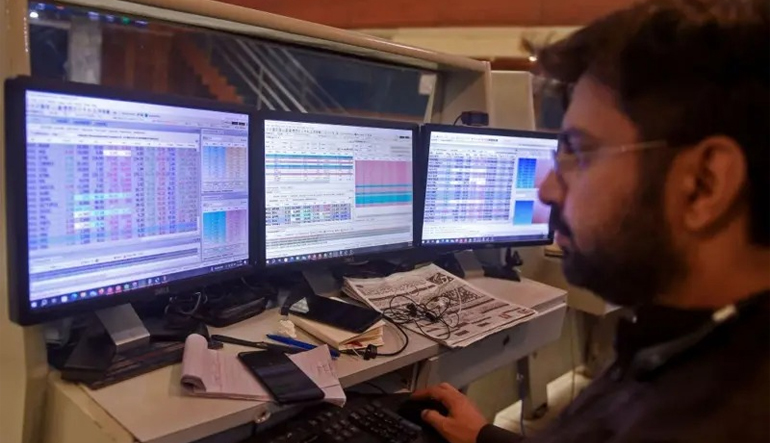

On Monday, the Pakistan Stock Market decline was historic, with nearly 4,000 points lost, marking a historic stock market drop that caused a widespread stock market crash in Pakistan. The Pakistan Stock Exchange performance saw a sharp fall, with share price decline in Pakistan across almost all sectors. According to the market summary released at the end of the trading day, most companies saw their share prices close lower compared to the previous trading day, with only a few exceptions. It is important to note that last Wednesday, U.S. President Donald Trump announced the imposition of U.S. tariffs on Pakistan, which has caused markets in the U.S., Europe, and Asia to experience a downturn. Initially, there was a surge in the Pakistan Stock Exchange decline on Thursday and Friday; however, experts had warned that Trump’s announcement could negatively impact Pakistan’s export sector, leading to an export sector and stock market downturn in the country. Currently, more than 520 companies are registered on the Pakistan Stock Exchange, with their shares being traded. Due to the severe decline in the stock market, the share prices of most companies saw a significant drop, prompting the application of stock market circuit breakers to prevent further decline. This resulted in a 5% overall decline, leading to stock market trading. After a 45-minute break, trading resumed, but the decline continued, initially reflecting stock market volatility in Pakistan. However, some buying by investors was then seen, which led to a recovery in the market and the session ended with a decline of about 4,000 points.
The Pakistan Stock Exchange experienced a significant downturn, with a decline in the share prices of companies across various sectors. According to the market analysis report by Topline Securities, the drop in the share prices of Engro Holdings, Oil and Gas Company Limited, Pakistan Petroleum Limited, and Pakistan State Oil contributed to an overall decrease of 1,287 points in the stock market. A decline in the share prices was recorded across all companies in the oil and gas exploration and marketing sector. The share prices of all companies in the automobile manufacturing sector also dropped. Similarly, all companies in the technology sector saw a decrease in their share prices. In the textile sector, out of the 33 listed companies, the share prices of almost all companies, except for a few, decreased. Impact of the new U.S. tariffs on Pakistani products: How will Trump’s decision affect Pakistan’s exports? Could Trump’s new global tax, 'Tariff King,' provide a new opportunity for India? Not even the island inhabited only by penguins escaped Trump’s tariffs: “No humans have visited there for 10 years.” The threat of a new trade war: How could Trump’s import taxes affect the U.S. economy? Similarly, except for a few banks, the share prices of most banks also decreased. The oil and gas sector lost 781 points, banks lost 578 points, investment and securities sectors lost 356 points, fertilizer sector lost 310 points, and the technology sector lost 300 points.

Except for a few banks, the share prices of all banks decreased.
According to experts, the recent upward trend in the Pakistani stock market last week was not due to the global economic landscape but rather the government's decision to reduce electricity prices. This stock market uptrend was mainly driven by economic policies affecting the stock market, particularly the electricity price reduction for domestic and industrial consumers. Analysts believe that the reduction in electricity prices was good news for the economy, which had a positive effect on stock market activity. The government also announced its plan to eliminate circular debt in the energy sector within five years, which could have long-term benefits for the Pakistani stock market. Financial expert Rashid Masood Alam stated that there is a perception that the Pakistani stock exchange is driven not by economic fundamentals but by a few individuals and groups who cause stock market fluctuations. However, major business entities do not directly intervene, though they are indirectly involved in the market. On the other hand, Shahid Ali Habib, CEO of Arif Habib Limited, refutes this perception. He argues that the investor base in the Pakistani stock market is very large, and it is not controlled by just a few hands. It includes asset management companies, banks, insurance companies, high-net-worth individuals, and foreign investors. He stated that a few individuals or groups can't control the market. He emphasized that the current uptrend in the market is driven by economic factors. "When the government reduced power tariffs, it was expected to result in higher earnings for the industry. On the other hand, the increase in US tariffs is not just a concern for Pakistan."
The imposition of tariffs by the United States on imports from countries like China and others has sparked a global economic ripple effect that has reached far beyond American borders. This significant policy shift led to a sharp decline in global trade, causing stock markets around the world to fluctuate unpredictably. In Pakistan, the impact of US tariffs was particularly severe, as it led to a stock market crash that shook investor confidence and destabilized the financial landscape. The economic repercussions for Pakistan were profound, with rising inflation, a decrease in foreign direct investment, and an overall slowdown in economic growth. The export sector also felt the pressure, as the tariffs disrupted trade relationships and reduced demand for Pakistani goods in global markets. This situation underscored the vulnerability of economies like Pakistan’s to external shocks, highlighting the complex and interconnected nature of today’s global economic system. As Pakistan navigates through these turbulent times, it faces the challenge of adapting to shifting trade dynamics and safeguarding its economy from further external disruptions.
Powered by Froala Editor